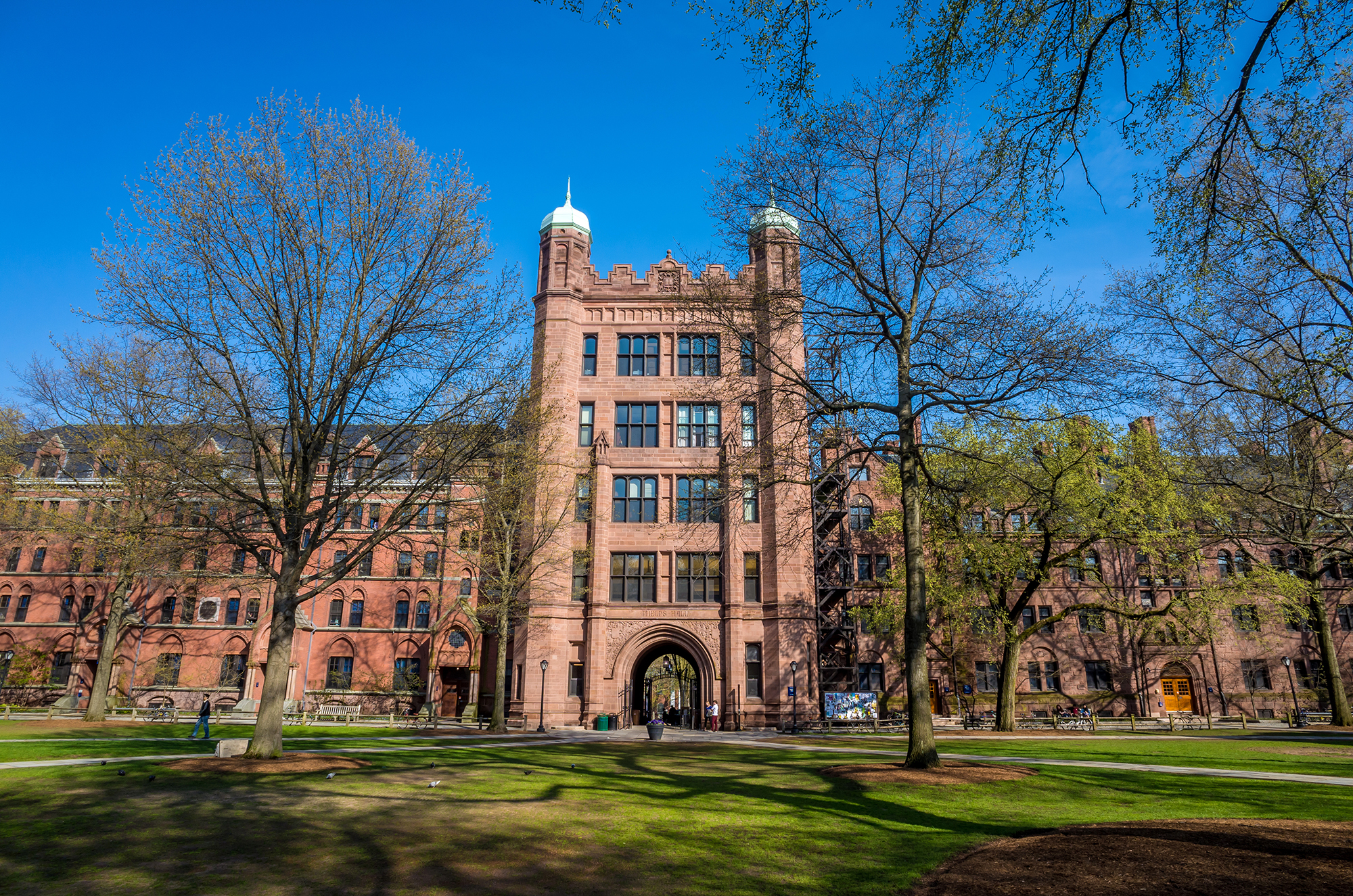Yale Full-Time MBA 2020-2021: Application Deadlines, Decision and Notification Dates

Yale Full-Time MBA 2020-2021 Application Deadlines
| Application Round | Application Deadline | Deposit Deadline |
|---|---|---|
| Round 1 | Sept. 15, 2020 | Dec. 8, 2020 |
| Round 2 | Jan. 7, 2020 | Mar. 26, 2021 |
| Round 3 | Apr 13, 2021 | May 18, 2021 |
Highlights of the Yale SOM Full-Time MBA 2021 Class
If you are researching programs and deciding on where to apply, it is important to understand where you stack up against the competition. Below are important metrics for the Cornell Johnson Full-Time MBA.
| Category | Statistics |
|---|---|
| Class Size | 345 students |
| Average Years of Work Experience | 5 years |
| Average GMAT/GRE | 720/330 |
| Average GPA | 3.66 |
| Class Split | 58% male, 42% female, 44% international passport holders |
MBA Checklist for the Yale Full-Time MBA 2020-2021
Refer to this list to be sure your application to the Two-Year MBA program or One-Year MBA program includes the following:
To apply to the Yale School of Management, applicants must have earned a four-year bachelor’s degree from an accredited U.S. institution or the international equivalent. Applicants must submit the online application (including an essay), and the following materials:
- Transcripts from every college or university attended
- Two professional recommendations
- Complete the video questions
- Official GMAT or GRE score (valid within 5 years of exam date)
- Pay the application fee (To make the application process as affordable as possible for candidates with diverse backgrounds, the Yale School of Management uses a sliding-scale application fee structure. The standard application fee is $250. For applicants earning less than $20,000 a year, the application fee is $175. For applicants earning less than $10,000 a year, it is $125. The application fee is based on the self-reported compensation information you provide in the application.)
Additional Resources
- To learn about other applicants applying to the Yale SOM Full-Time MBA, check out the Yale SOM MBA LiveWire via Clear Admit, the leading independent resource for top-tier MBA applicants. MBA LiveWire is a social forum for applicants to share their journey throughout the admissions process.
- The application process can be overwhelming, fortunately you can view FAQ, Essay Topic Analysis, Interview Reports and much more via Clear Admit’s Yale SOM in-depth school profile here.
- To research more information about program cost, financial aid and curriculum, check out the Yale SOM full-time MBA snapshot here.
The Class of 2020 Begins at Yale SOM

In late August, the newest group of Yale School of Management Master of Advanced Management, Master’s Degree in Global Business, and Society (GBS), and Master’s Degree in Systemic Risk students officially began their Class of 2020 journey.
Yale SOM deans and faculty members introduced the 120 one-year Master’s students at the Edward P. Evans Hall’s Zhang auditorium. Formally introducing the new students, Deputy Dean Anjani Jain said:
“You are entering the school at a time of exciting transition as Dean Kerwin Charles takes the helm. “Your presence here is a mark of your ambition to make a lasting contribution to both private industry and the public good.”
MBA graduates that are members of the Global Network for Advanced Management are welcome to enroll in the Yale SOM Master of Advanced Management. The Master’s Degree in Global Business and Society is typically geared towards younger students that may not have an MBA yet, or are currently members of the Global Network for Advanced Management.
Andrew Metrick, the Janet L. Yellen Professor of Finance and Management, also spoke at the welcome event, telling new Yale SOM students, “It’s been a fantastic experiment that has now grown into a core part of the school.”
Valentina Antill, Managing Director at Citigroup and ’94 alum, also addressed students at the event, starting off the introductory week at Yale SOM. Students also participated in workshops, tours, team projects, and more.
For more information on the Class of 2020 and details about Yale SOM Master’s options, click here.
The MBA Tour Returns to Washington DC

Considering business school? Join us at The MBA Tour DC on Thursday, July 25 to meet Columbia, Georgetown, Yale, Johns Hopkins, IE, UCLA, LBS, & more Top B-Schools!
Learn more about the event here
.
School vs. School: Yale SOM or SC Johnson Cornell?

Deciding which school you’ll attend for your MBA isn’t easy. There are many factors that come into play when choosing the best school for you. You might be most concerned about where and what you want to study, or you could care more about reputation, alumni network, ROI, or even the application process.
Unfortunately, this comparison process can get quite tricky when looking at two very similar schools. To help you out, our School vs. School series does the heavy lifting for you. Take a look at two of the best b-schools Yale SOM and SC Johnson Cornell to see which is best for you.
Yale vs. Cornell: Location
Yale SOM is located in New Haven, Connecticut while SC Johnson Cornell is in Ithaca, New York. In both instances, the schools are located in smaller towns where one-of-a-kind shops, boutiques, and activities rule the day. Neither location is a place where an MBA would look for a job post-graduation, but both are just a little ways outside of New York City. New Haven is under two hours away by car while Ithaca is around four hours away.
As for which town is better:
- Cost of Living: Ithaca is 2 percent less expensive than New Haven.
- Housing: Ithaca housing costs 34.4 percent more.
- Education: New Haven spends 4 percent less per student, and the student to teacher ratio is 17.3 percent higher in New Haven.
- Commute: New Haven residents commute 42 percent more than residents of Ithaca.
- Jobs: Future job growth for New Haven is 19.38 percent compared to Ithaca, which is only 2.24 percent. Both are lower than the entire U.S., which is 30.54 percent.
Overall, Ithaca is a more affordable place to live, but you’re less likely to find a job in Ithaca after graduation.
Yale vs. Cornell: Rankings
Yale SOM and SC Johnson Cornell are both top business schools in the world. Each ranks highly across all publications with Yale SOM just edging out SC Johnson Cornell in most rankings.
Yale and Cornell School Rankings
| Publication | Yale SOM | SC Johnson Cornell |
|---|---|---|
| U.S. News & World Report | 11 | 15 |
| The Economist (Global) | 14 | 17 |
| Financial Times (Global) | 11 | 27 |
| Forbes | 13 | 10 |
| Bloomberg Businessweek | 12 | 11 |
Yale vs. Cornell MBA: The Cost
Each business school costs about the same on a per-year basis. Tuition is not even $3,000 more at Yale, and when you add on the increased cost-of-living, Yale is just $5,000 more per year than Cornell. Where Cornell saves the most is in housing and food, which is only $16,800 a year compared to Yale’s distressing $22,214.

When it comes to living on campus, Yale students are emptying their wallets more, paying an average annual rate of more than $22,000.
However, when it comes to funding, Yale SOM wins. One in every two Yale SOM MBA students earns a merit scholarship. Even better 29 Yale MBA students end up with full-tuition scholarships. On the other hand, only 30 percent of Cornell SC Johnson students receive some scholarship assistance. However, there are many full-tuition scholarships available including 25 Park Leadership Fellowships.
Yale and Cornell School Costs
| Cost | Yale SOM | SC Johnson Cornell |
|---|---|---|
| Tuition | $72,350 | $69,440 |
| Full Cost | $100,274 | $95,340 |
Yale vs. Cornell: Post-Graduation Employment
When it comes to post-graduation, both Yale SOM and Cornell SC Johnson MBA students can expect many opportunities for success. About 94 percent of Cornell MBA students and 91.9 percent of Yale SOM graduates have a full-time job offer three months after graduation.
Those graduates enter a range of industries with the top industries being consulting, finance, and technology. Consulting was the top industry at Yale SOM whereas Cornell students preferred finance. In both cases, most students chose to stay in the Northeast U.S. with 55 percent of Cornell graduates staying in the area and 48 percent of Yale graduates.
Yale vs. Cornell Employment
| Industry | Yale SOM | SC Johnson Cornell |
|---|---|---|
| Consulting | 34.9% | 22% |
| Finance | 23.1% | 29% |
| Tech | 14.9% | 18% |
As for post-graduation salary, both schools are on par with each other. Graduates can expect to earn slightly over $125,000 after graduation with a bonus of around $30,000.
Yale vs. Cornell Salary
| Salary | Yale SOM | SC Johnson Cornell |
|---|---|---|
| MBA Graduate Median Base Salary (2018) | $127,100 | $126,353 |
| Median Signing Bonus | $30,000 | $33,503 |
Inside Yale SOM
Located in New Haven, Connecticut, Yale SOM is one of the top business school’s in the country. Its proximity to New York City means that MBA students have access to many highly coveted networking, partnership, and placement opportunities in one of the business hubs of the world. Its programs are ranked in the top 15 in the world across all international and U.S.-based MBA rankings, regularly placing 11th overall.
Program Offerings
- Full-Time MBA: The two-year, full-time MBA program at Yale SOM requires students to earn 72 credits—39 of which are electives.
- EMBA: The 22-month Executive MBA program at Yale offers classes on alternating weekends (Friday and Saturday) and is ranked first in the world according to The Economist.
There are also multiple joint degree opportunities. MBA students can pursue a joint degree with Yale Law School, Yale School of Medicine, the Yale School of Forestry & Environmental Studies, and the Yale School of Architecture.
Why Yale SOM?
- Yale SOM emphasizes “raw” online cases. These cases attempt to capture the complexity of real decision-making.
- MBA students can participate in 50-plus student clubs on a variety of topics from leadership to social venture.
- Yale MBA students are required to complete an international component, including a 10-day trip to one or more countries. The school is also a part of an exchange program with the London School of Economics, HEC Paris, IESE, National University of Singapore, and Tsinghua University School of Economics.
Inside SC Johnson Cornell
Located in Ithaca, New York, the SC Johnson College of Business at Cornell University is one of the best business schools in the world. It regularly ranks in the top 25 schools globally and the top 15 schools nationally. Its proximity to NYC means that students have many opportunities for networking, internships, and more.
Program Offerings
- Two-Year MBA: The two-year, full-time MBA program at Cornell includes more than 4,000 elective courses from any of Cornell’s top-ranked schools.
- One-Year MBA: The One-Year MBA is designed for students who have already earned a certification or are enrolled in a dual degree program.
- Tech MBA: The Tech MBA program is a 12-month program in the heart of New York City on Roosevelt Island. The curriculum is split into module and studios.
- EMBA NY: The Executive MBA program is 22 months in length and requires students to complete 60 credits every other weekend on Saturday and Sunday.
There are also multiple dual degree programs including a JD/MBA and an MS/MBA. Other dual degree opportunities include a degree in Industrial and Labor Relations, Real Estate, and Health Administration.
Why SC Johnson Cornell?
- Cornell SC Johnson offers eight immersion opportunities. These courses and their projects/cases are based on a specific career path and industry.
- Students have access to more than 120 electives across a range of concentrations. There are also more than 80 professional, regional, and diversity clubs students can join.
- Global learning is not a requirement. However, there are a large number of international business learning opportunities, including international study trips and an international exchange program.
For additional insight, be sure to check out the news at both Yale and Cornell.
3 Essential MBA Essay Question Tips

For many applicants, the MBA essay question is the single most terrifying and challenging part of the entire MBA application. More than your GMAT, GPA, or resume, the essay is extremely personal. The admissions committee uses it to get to know who you are, what you want, and how you’ll fit. And that’s a lot of pressure.
To succeed in your MBA essay, you have to know who you are well enough to paint a comprehensive picture that the admissions committee will keep reading until the last word. You want your story to be interesting, to answer the essay prompts, and to demonstrate “why you.”
And though every school has different MBA essay prompts, three essential elements are always vital. Continue reading…
NYU Stern and Yale SOM Professors Awarded Nobel Prize in Economics

Faculty define a business school. Their research, teaching, mentorship, and influence have tremendous impact on the experience students have while there and often the careers they pursue once they graduate. From the curriculum they shape to the initiatives and centers they help run, faculty are vital. And it certainly never hurts when those faculty are also Nobel Prize winners.
This year, professors at two leading business schools were recognized with the 2018 Nobel Prize in Economic Sciences: Paul Romer at NYU Stern School of Business and William Nordhaus of Yale School of Management (SOM).
Nobel Prize Winners in Economics
At first glance, Romer and Nordhaus might seem unrelated. Romer has spent his career focusing on the nature of economic growth, seeking to answer the burning question, “Why do economies grow and how?” Nordhaus’ work, on the other hand, dives deep into the economic costs of environmental damage in an effort to gauge how much society would be willing to pay to avert climate change.
And yet both men have been hailed by Sveriges Riksbank, which awards the economics prize, as individuals known for “integrating innovation and climate with economic growth,” The Economist reports. They have also both influenced the way other economists think about critically important and complex systems.
Paul Romer
Paul Romer joined NYU Stern in 2010. Currently on leave, Romer is best known for founding the NYU Stern Urbanization Project in 2011, which conducts applied research on how policymakers in the developing world can use city growth to create economic opportunity and enact social reform.
In economics, Romer is known for developing the “endogenous growth model” and other approaches for spurring the market to generate new ideas. These models are based on the belief that the pace of growth and ways in which ideas are translated into growth depends on factors such as state support for research and development of intellectual-property protections. Hailed as a critical step toward understanding patterns of economic growth across the globe, his models highlight that the creation and spread of ideas is necessary for growth, but not alone adequate for initiating it.
In awarding Romer with the Nobel Price in Economics Sciences, the Swedish Academy cited his influence on “integrating technological innovations into long-run macroeconomic analysis.” (NYU Stern News)
William Nordhaus

Photography ©Mara Lavitt October 8, 2018 Evans Hall, Yale School of Management, 165 Whitney Ave. New Haven Yale University press conference presenting William Nordhaus, the Sterling Professor of Economics at Yale University. Nordhaus was awarded the 2018 Sveriges Riksbank Prize in Economic Sciences in Memory of Alfred Nobel.
Yale SOM Professor William Nordhaus has significantly impacted the teaching of economics at the school. A few years ago, he chaired the Yale Carbon Task Force, which looked at the market price of carbon-related products to determine the need for a market correction due to over-consumption or potential externalities. In particular, the task force delved into questions about distributing costs through organizations, tax effects of corrections, and connectivity problems and solutions.
As a professor, Nordhaus is best known for connecting people with important issues. He asks tough questions that make economics more accessible for everyday people and policymakers.
In economics specifically, he is best known for tackling complex systems surrounding climate change. His research has examined the economic costs of environmental damage and how much society would be willing to pay to avert them. As part of his work, he has combined mathematical descriptions of emissions with integrated assessment models, allowing him to project the impact of different global carbon emissions trajectories on global temperatures.
In awarding him the Nobel Prize in Economics, the Swedish Academy praised his work for “integrating climate change into long-run macroeconomic analysis.” (Yale SOM News)
Changing the Face of Economics
In the end, there’s no denying that both Romer and Nordhaus have blazed new trails in economics and humanity. Their names are synonymous with grappling with global issues we can’t afford not to understand.
